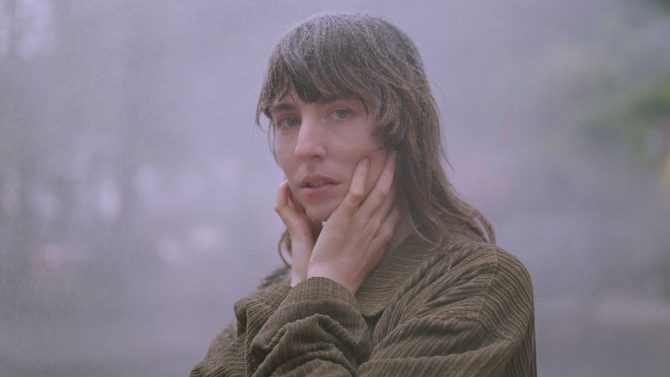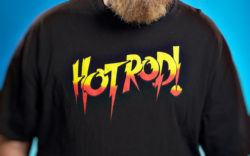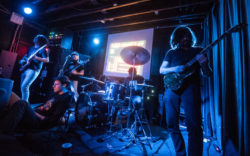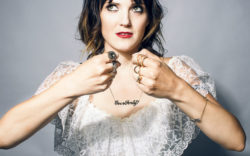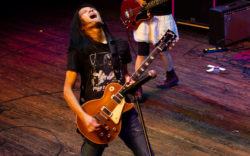When Flagpole last spoke to Kristine Leschper, leader of the formerly local indie-rock band Mothers, she was prepping for a nationwide tour in celebration of the release of the band’s debut album, When You Walk a Long Distance You Are Tired. That album and tour were accompanied by a whirlwind of hype and press—the most nationwide attention a new Athens band had received in nearly a decade.
After several stressful months on the road—a time that Leschper describes as both “physically and mentally unhealthy”—she made the decision to move to Philadelphia for a change of pace. Now, Mothers have released an acclaimed sophomore album, Render Another Ugly Method, and are embarking on another tour. The band’s upcoming 40 Watt show will be Leschper’s first time in Athens since she moved one year ago, and it’s a homecoming she’s been eagerly anticipating.
“I feel nostalgic about Athens all the time,” says Leschper. “Athens is where I became a person. I grew up somewhere else, but Athens is where I found myself. I have a lot of memories of experiences there that I feel really formed me.
“There’s also so much good food there,” she adds. “I miss The Grit every day.”
Despite feeling homesick, Leschper says moving was a necessary transition. “I moved to Philadelphia as a challenge to myself,” she says. “I’ve never lived in a big city before, but in a lot of ways, Philadelphia just kind of made sense to me. I knew that it was a city that I could afford to move to, which was a huge deciding factor. I don’t feel that moving to Philadelphia has inherently changed anything about me or the way I work, but it’s been really nice to be out of my comfort zone.”
For Leschper, that partly means being aware of herself as a transplant in a city with serious gentrification issues.
“I knew that, moving to a city, I would have to consider my impact on the city at large, and the culture that already exists there. Every time you turn a corner or go down a new block, there’s constant construction,” she says. “So, I guess it’s been challenging in the sense that I have a whole new set of things to grapple with in terms of being a person who is not displacing others. That’s something I’m still trying to figure out.”
In addition to to the change in scenery, Mothers have gone through a series of personnel shakeups. According to Leschper, the band is a naturally collaborative project, and she is always open to new artists contributing their talents, even if for just a short time.
Leschper clarifies, “Matt [Anderegg] was the first person I really played music with—the first person I really trusted to work on my songs and to collaborate with. So, we are the core collaborators of the project, and the other collaborators we’ve worked with have changed over time.”
Render Another Ugly Method signifies a songwriting evolution for Leschper, who comes from the world of poetry and has made a point to work creative writing techniques into her songs. She refers to the album as a “really active text,” and says it was shaped by her exposure to new styles of music.
“When You Walk was written very quickly and intuitively without much fuss, while writing Render was more about challenging whatever was initially written and kind of tearing that apart and reassembling it,” Leschper explains. “It references the cut-up techniques that the Dadaists used that was later used by William Burroughs. The process often included discarding most of a written song in order to rewrite around one small, particular section.”
On their website and in press releases, Mothers have included a sort of thesis statement to go along with the new album. It reads, “Render Another Ugly Method is an assemblage of personal vignettes and imagined scenarios that examine consent, escape of the body, power and powerlessness and the act of making.”
“I’ll say that my writing in general tends to be self-referential, in that I’m often writing about the act of writing itself,” says Leschper. “I feel really caught up on how being a maker sometimes feels connected to my self-worth… I think [it’s] really indulgent and harmful to feel that way—to couple your creative output with your right to exist. But even though I feel negatively about it, it’s still a school of thought that I find myself participating in. So, a lot of my writing is about dissecting this and trying to establish a healthier relationship with my own work.
“That’s where the title of the record comes from,” she explains. “To render another ugly method is to create work in this ugly way that seeks validation through itself. That’s sort of a trope that I’m aware of in my own work ethic that I’ve been writing about a lot in order to better understand it.”
Like what you just read? Support Flagpole by making a donation today. Every dollar you give helps fund our ongoing mission to provide Athens with quality, independent journalism.



